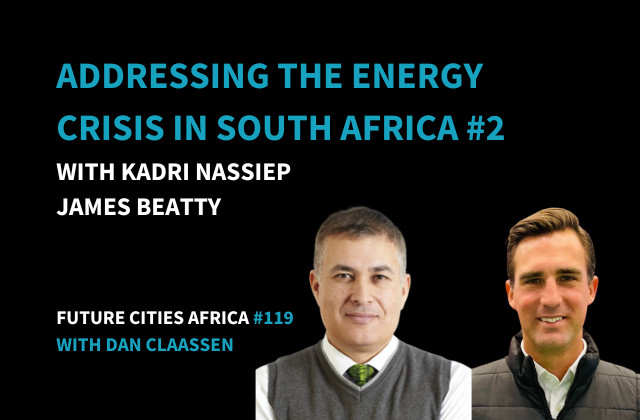Listen to Audio
Technologies For Energy Efficiency And Renewable Energy Projects In Municipal Wastewater Treatment Works
Jane Reddick, Programme Manager for Water and Agriculture at GreenCape explains the energy-intensive processes, proven technologies, considerations for successful implementation and the business case for energy efficiency and renewable energy projects in Municipal Wastewater Treatment Works.
Stay Connected
Overview:
GreenCape is a non-profit organisation that drives the widespread adoption of economically viable green economy solutions from South Africa.
They are working on a multi-stakeholder project with the financial support of the Green Climate Fund, implemented and managed by UNIDO | United Nations Industrial Development Organization, focused on pipeline development to deploy clean energy technology solutions in municipal wastewater treatment works of South Africa, providing readiness activities for the Green Climate Fund.
Ultimately this project aims to support the utilisation of climate finance in the municipal Wastewater Treatment Works space, where Energy Efficient and Renewable Energy applications can assist.
Episode Summary:
- 00:00:00 In this section, Jane Reddick, Programme Manager for Water and Agriculture at GreenCape discusses the energy-intensive processes at municipal wastewater treatment works. She explains that the primary treatment is not a big energy user, but the secondary treatment, which removes organic matter, requires a significant amount of energy, mainly due to aeration. Other energy-intensive processes include pumping, motors, and sludge treatment. To improve energy efficiency, she recommends conducting energy audits to identify areas of high demand. Then, specific technologies can be implemented based on the audit findings to reduce energy consumption.
- 00:05:00 In this section, Jane discusses the various opportunities for energy efficiency in municipal wastewater treatment works. She emphasizes that simple interventions like optimizing processes and installing variable frequency drives can lead to significant energy savings. Additionally, she highlights the importance of efficient sludge management, including gravity thickeners and dewatering technologies. The speaker also explains how renewable energy technologies like solar panels can be integrated into wastewater treatment works. She mentions that solar PV systems can be grid-connected or include battery storage for extended power and load shedding protection. Overall, implementing these energy efficiency and renewable energy interventions can help reduce energy consumption and improve the sustainability of wastewater treatment processes.
- 00:10:00 In this section, Jane Reddick discusses various renewable energy technologies that can be used in wastewater treatment works. She mentions that solar PV panels could be installed on buildings or as floating systems in bodies of water on the site. She also introduces the concept of biogas for combined heat and power (CHP), explaining that wastewater treatment works that use anaerobic digestion produce biogas, which can be converted into electricity and used in the plant. This not only reduces costs and greenhouse gas emissions but also makes sludge disposal safer. Other renewable energy technologies, such as mini hydro and wind power, are also mentioned as potential options for wastewater treatment works.
- 00:15:00 In this section, Jane discusses the potential for using wind energy as a renewable energy source for wastewater treatment works. She emphasizes the importance of conducting multi-year wind studies to validate the feasibility of wind energy implementation. While wind energy is not widely used for this purpose, it is considered an option. The speaker also mentions other opportunities such as thermal hydrolysis and energy storage, which can be utilized for solar PV or other interventions. She highlights the business case for implementing renewable energy and energy efficiency, suggesting that focusing on energy efficiency interventions first can lead to significant energy savings and short payback periods. She stresses the benefits of reducing costs, carbon emissions, and mitigating the impacts of load shedding. She also mentions resources available, such as a practical guideline for energy efficiency audits at wastewater treatment works produced by SALGA and GIS.
- 00:20:00 In this section, Jane recommends conducting energy audits as the first step towards energy efficiency in wastewater treatment works. She mentions a report by the water research commission that provides an assessment framework for energy efficiency and renewable energy. The speaker also discusses other useful resources, such as the anaerobic digestion practical guideline and the biogas potential study. She highlights their own project, funded by the green climate fund, which aims to increase the deployment of renewable energy and energy efficiency interventions in wastewater treatment works. As part of this project, fact sheets on energy efficiency and renewable energy technologies will be published on their website.







